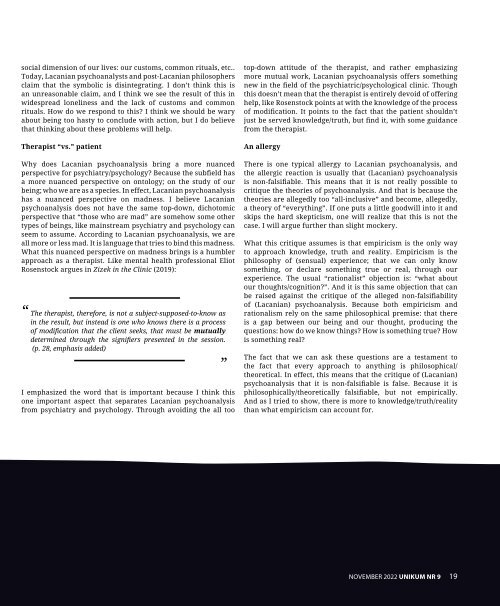Unikum 09 November Web
You also want an ePaper? Increase the reach of your titles
YUMPU automatically turns print PDFs into web optimized ePapers that Google loves.
social dimension of our lives: our customs, common rituals, etc..<br />
Today, Lacanian psychoanalysts and post-Lacanian philosophers<br />
claim that the symbolic is disintegrating. I don’t think this is<br />
an unreasonable claim, and I think we see the result of this in<br />
widespread loneliness and the lack of customs and common<br />
rituals. How do we respond to this? I think we should be wary<br />
about being too hasty to conclude with action, but I do believe<br />
that thinking about these problems will help.<br />
Therapist “vs.” patient<br />
Why does Lacanian psychoanalysis bring a more nuanced<br />
perspective for psychiatry/psychology? Because the subfield has<br />
a more nuanced perspective on ontology; on the study of our<br />
being; who we are as a species. In effect, Lacanian psychoanalysis<br />
has a nuanced perspective on madness. I believe Lacanian<br />
psychoanalysis does not have the same top-down, dichotomic<br />
perspective that “those who are mad” are somehow some other<br />
types of beings, like mainstream psychiatry and psychology can<br />
seem to assume. According to Lacanian psychoanalysis, we are<br />
all more or less mad. It is language that tries to bind this madness.<br />
What this nuanced perspective on madness brings is a humbler<br />
approach as a therapist. Like mental health professional Eliot<br />
Rosenstock argues in Zizek in the Clinic (2019):<br />
“<br />
The therapist, therefore, is not a subject-supposed-to-know as<br />
in the result, but instead is one who knows there is a process<br />
of modification that the client seeks, that must be mutually<br />
determined through the signifiers presented in the session.<br />
(p. 28, emphasis added)<br />
I emphasized the word that is important because I think this<br />
one important aspect that separates Lacanian psychoanalysis<br />
from psychiatry and psychology. Through avoiding the all too<br />
”<br />
top-down attitude of the therapist, and rather emphasizing<br />
more mutual work, Lacanian psychoanalysis offers something<br />
new in the field of the psychiatric/psychological clinic. Though<br />
this doesn’t mean that the therapist is entirely devoid of offering<br />
help, like Rosenstock points at with the knowledge of the process<br />
of modification. It points to the fact that the patient shouldn’t<br />
just be served knowledge/truth, but find it, with some guidance<br />
from the therapist.<br />
An allergy<br />
There is one typical allergy to Lacanian psychoanalysis, and<br />
the allergic reaction is usually that (Lacanian) psychoanalysis<br />
is non-falsifiable. This means that it is not really possible to<br />
critique the theories of psychoanalysis. And that is because the<br />
theories are allegedly too “all-inclusive” and become, allegedly,<br />
a theory of “everything”. If one puts a little goodwill into it and<br />
skips the hard skepticism, one will realize that this is not the<br />
case. I will argue further than slight mockery.<br />
What this critique assumes is that empiricism is the only way<br />
to approach knowledge, truth and reality. Empiricism is the<br />
philosophy of (sensual) experience; that we can only know<br />
something, or declare something true or real, through our<br />
experience. The usual “rationalist” objection is: “what about<br />
our thoughts/cognition?”. And it is this same objection that can<br />
be raised against the critique of the alleged non-falsifiability<br />
of (Lacanian) psychoanalysis. Because both empiricism and<br />
rationalism rely on the same philosophical premise: that there<br />
is a gap between our being and our thought, producing the<br />
questions: how do we know things? How is something true? How<br />
is something real?<br />
The fact that we can ask these questions are a testament to<br />
the fact that every approach to anything is philosophical/<br />
theoretical. In effect, this means that the critique of (Lacanian)<br />
psychoanalysis that it is non-falsifiable is false. Because it is<br />
philosophically/theoretically falsifiable, but not empirically.<br />
And as I tried to show, there is more to knowledge/truth/reality<br />
than what empiricism can account for.<br />
NOVEMBER 2022 UNIKUM NR 9 19


















